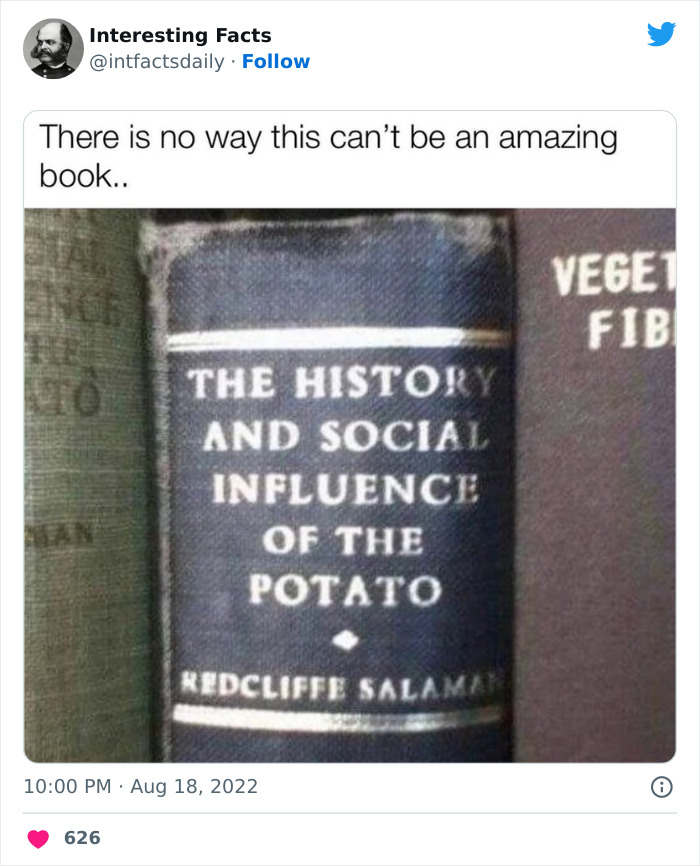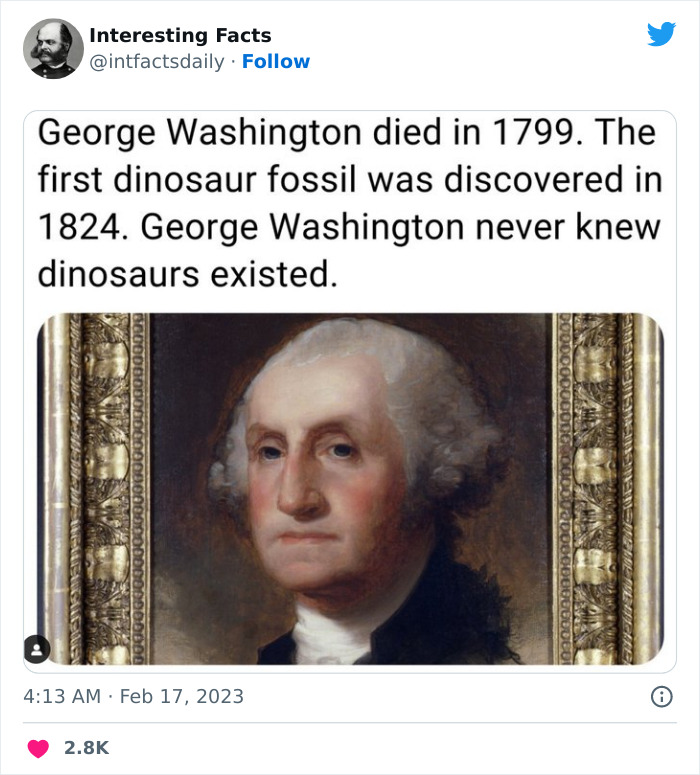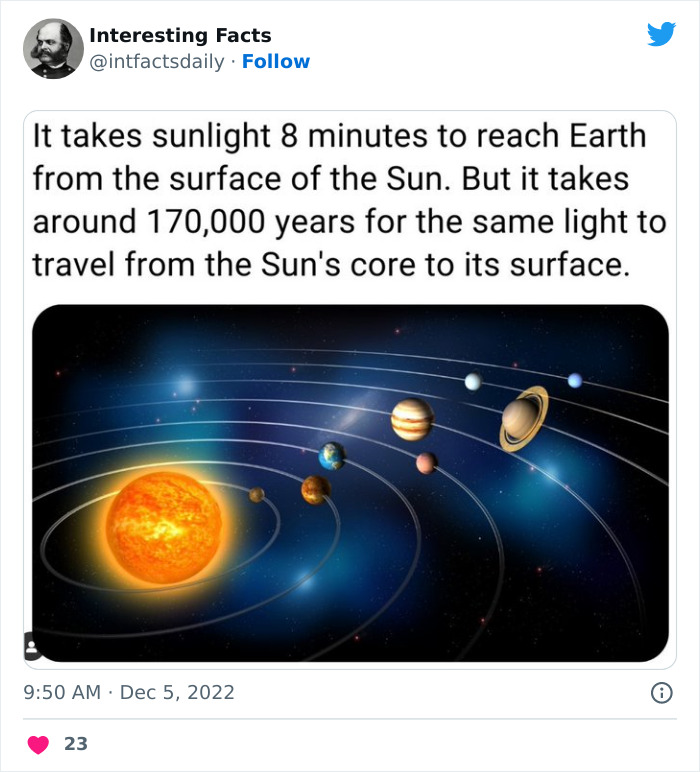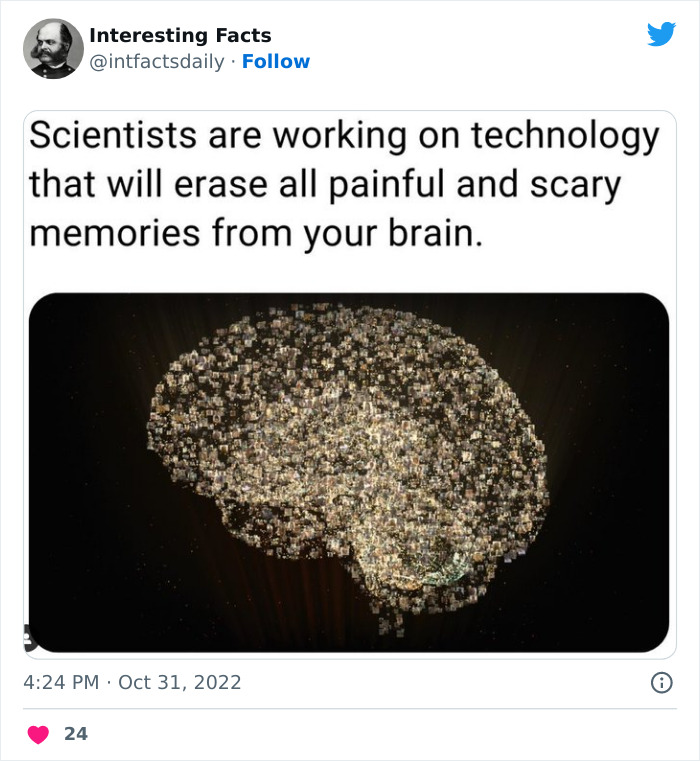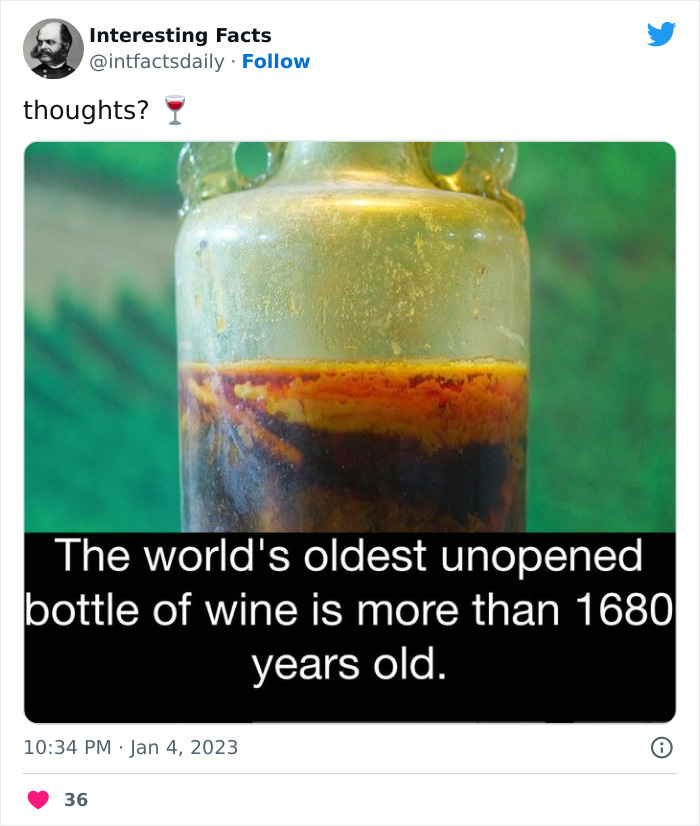
96Kviews
30 Random Facts About Everything, Shared By A Twitter Account Called “Interesting Facts”
In the old days, people often confused wisdom and erudition. At that time, the whole modern methodology of scientific research had not yet been invented, therefore, whoever knew more scattered random facts about the world around us was sometimes considered a sage.
Now those days are gone, and just knowing a lot of things about everything will only get you through trivia quizzes or might come in handy while playing Jeopardy. But how pleasant it is sometimes to show off one's erudition among friends! And just for such cases, various dedicated Twitter pages - like this one, for example - collect wonderful lists of cool and thrilling facts from here, there and everywhere.
This post may include affiliate links.
Of course, many of the facts in such collections need detailed proofreading and some are partly taken out of context. For example, the one about George Washington, who never knew that dinosaurs existed. Yes, technically, this is absolutely true, but in reality, of course, people found fossils of prehistoric giants long before Washington - just guesses about whose bones these were, were actually far from the truth.
In many ways, we owe the finds of dinosaur bones to numerous myths and legends about dragons, giants, and other fantastic creatures. And only in 1842, the English biologist Richard Owen suggested the term 'dinosaur' per se. So yes, George Washington didn't really know about the existence of dinosaurs. And he did not know about the existence of Neptune as well - after all, the planet was only discovered in 1846.
Thank you for the reminder that a healthy brain equals the brain of the majority only. Us with any hint of autism will always struggle with sarcasm and taking words too seriously -but we can easily imagine the world could do without people saying things they don't mean. Any autist would agree in wishing for everyone to just say what they mean without the filters we use to sound more acceptable.
There are probably a very large number of "signs of a healthy brain." Pointing out one isn't meant to say that it's the only sign.
Load More Replies...Oh good! Now if only I could remember to bring my lunch to work everyday
Swearing is, too. My brain health is doing fine based on my swearing and sarcasm.
Not really, but it does give us a bit of a chuckle to think that we made someone else think about what they said.
None of the people in the picture look sarcastic. Perhaps it's the coffees that are being sarcastic?
Guess my brain is healthy? That’s good bc my physical health could use some work
Having to point out that you are being sarcastic, which I see often in here, really takes the sting out of it! /s
It's tough without being able to hear the tone though. Safer to add the /s in writing as a replacement for the tone that is sometimes the only indication of whether something is sarcastic or serious.
Load More Replies...After hundreds of interviews, I now look for sarcasm as the chief sign of a lively and adaptable mind. So all my staff are sarcastic as hell, just saying!
I was told it's a mental health issue. Do I really need another one?
Only if it's used to hurt. There's hurtful sarcasm and humorous sarcasm.
Load More Replies...Yeah? Seems like somebody drove past a medical school and thinks that makes him a doctor.
I was going to respond...but now afraid I will reveal my unhealthy brain if my response is not dripping in sarcasm
On the other hand, what may seem ridiculous to us is actually of great importance - including scientific too. For example, the book The History and Social Influence of the Potato really exists, and even went through several reprints. And if you think that potatoes have not had any impact on world history, you are clearly mistaken.
In fact, it is enough to recall, for example, the infamous 'Great Famine' in Ireland in 1845-1849, when the potato was the basis of the diet for the poor, and the massive infection of potato crops by pests caused not only famine, but also mass emigration. Mostly to the United States and Canada. To appreciate the scale, just imagine that by the middle of the 19th century, about a quarter of the population of large cities on the east coast of the United States were Irish. And this is just one aspect of the impact potatoes actually had on the history of humanity...
Also, pictures like these often make us think and we involuntarily make interesting little discoveries for ourselves - for example, that photo of an old mechanical shopping list dated by the first half of the 20th century presumes that ketchup used to be called 'catsup'. Yes, that's absolutely right - even this early recipe from 1817 calls the sauce 'tomata catsup', and suggests the additions of anchovies and cochineal... By the way, according to this recipe, the resulting prototype of ketchup could be stored for no less than seven years!
By and large, there is a wonderful and fascinating story behind almost any of the pictures in this collection, which Bored Panda has carefully made especially for you. So please feel free to scroll and read to the very end, and in case at least one of these submissions really interests you, we can rightly say that our work was not in vain. Or you could just enjoy simply scrolling and commenting on it, so please don't hold back!
Cleopatra lived closer to the release of the first iPhone than she did to the building of the great pyramid at Giza. Let that sink in...
Once again there were no new ‘facts’, just the same facts copied from every other ‘amazing historical facts’ post you make.
Cleopatra lived closer to the release of the first iPhone than she did to the building of the great pyramid at Giza. Let that sink in...
Once again there were no new ‘facts’, just the same facts copied from every other ‘amazing historical facts’ post you make.

 Dark Mode
Dark Mode 

 No fees, cancel anytime
No fees, cancel anytime 











